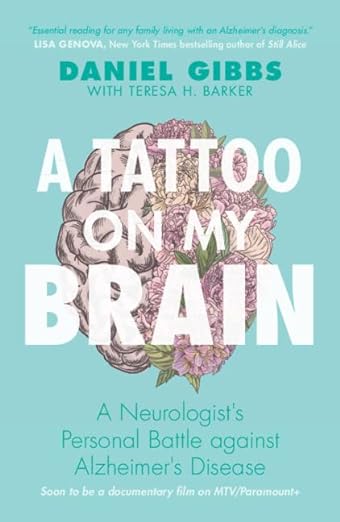In his memoir of his journey through the transition from one side of the neurology consulting room desk to the other, Daniel Gibbs charts the prodromal and early manifest stages of his journey with Alzheimer’s disease with a mixture of academic intrigue, pioneer’s spirit and sufferer’s pathos. This book is not a woe-is-me call for sympathy, but both a passionate and dispassionate account of the effects that his diagnosis has on him and his family, as well as the very concrete, practical steps Dr Gibbs has taken to challenge the inevitable progression through all means at his disposal.
One of the key messages that he proposes is that for too long the focus of work in dementia has been the later phases, but that for effective disease modification it is necessary for attention to pivot to the opposite end of the disease spectrum: where the pathology is anatomically limited, and the patient’s cognitive and physiological reserve remain robust in order to effect meaningful change in the trajectory of progression. He describes in a way that is accessible for a lay reader, and informative for those with medical training the how and the why of specific lifestyle modifications. These include diet (with a helpful appendix on the MIND diet (Mediterranean-DASH Intervention for Neurodegenerative Delay)), social engagement, sleep, and even the positive effects of music and the detrimental effects of the loss of the emotional repertoire that is caused by smell loss.
Key to his journey, and the narrative of the book, is his engagement as a participant in an aducanumab trial. He does so fully cognizant of the fact that he may not benefit from being a participant, but does so in order that the body of knowledge grows, and in the hope that a paper that he’s an anonymous participant in leads to a light-bulb moment in the mind of someone who may then create meaningful change in the field. He illustrates his involvement from serial PET studies (in which he describes his progression with well annotated colour plates) to the significant symptomatic Amyloid Related Imaging Abnormality (ARIA) caused by the monoclonal antibody – the related haemorrhage leading to the literal and figurative tattoo left on his brain that gives the book its title.
Dr Gibbs offers the philosophy that “helplessness and hopelessness have been the dominant theme of the conversation for more than a century” (p. 125) and this book is a personal challenge to that. There is no false hope, he leaves the reader in no doubt that he and his family are aware of what the future holds, but there is a call to arms for the medical and scientific audience, as well as the general public, to not take Alzheimer’s lying down, but to rise up, individually and collectively to do whatever we can to fight back.
